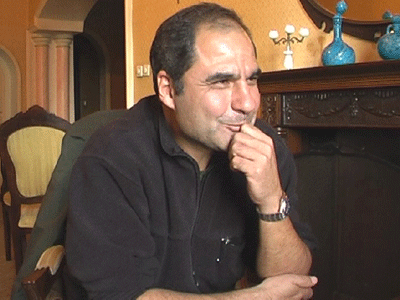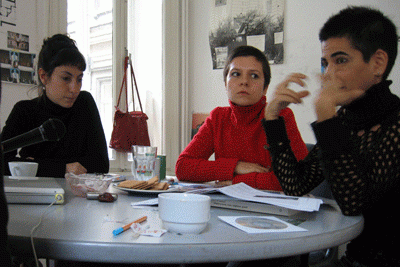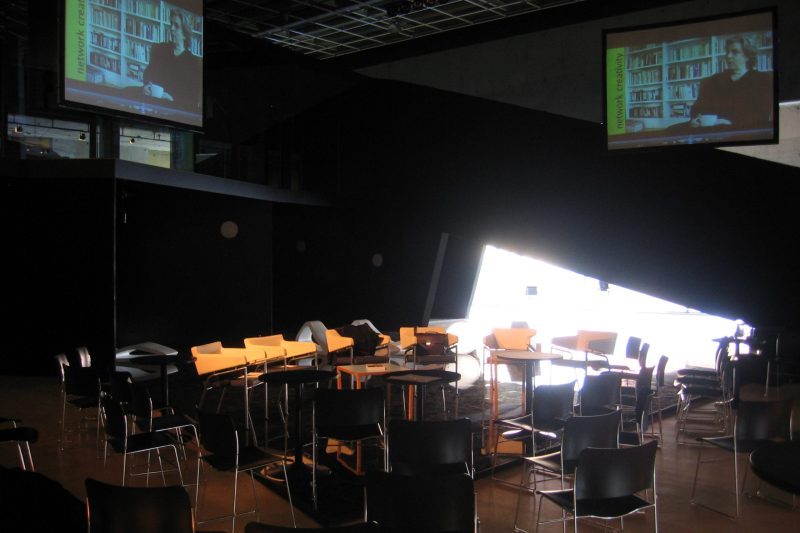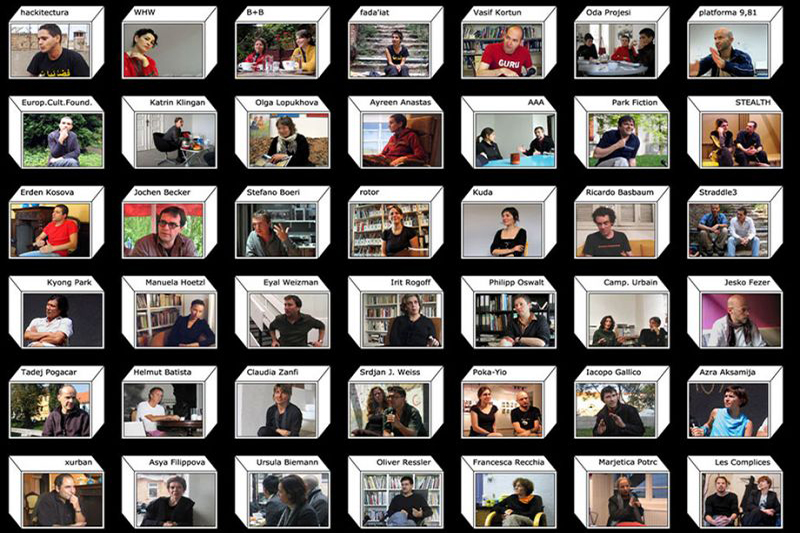- Interview
- Istanbul
- 2005
- NETWORKED CULTURES
CONVERSATION WITH GUVEN INCIRLIOGLU
PM/HM: On the website of xurban_collective, there’s a manifesto with eleven points, and in one of these you mention that as long as English continues to be the common language, the Internet will remain the last and only transnational territory …
Guven Incirlioglu: This relates to global restrictions imposed upon the circulation of bodies. Some of our projects involve a kind of transfer and this is a topic now high on our agenda. What is being globalised is capital and its circulation, as well as commodities. Yet at the same time, we increasingly see people locked up within their own territories and not free to travel at all. Interestingly enough, in Turkey, which is getting closer to becoming part of Europe – at least in negotiations – it is ever more difficult for Turkish citizens to get visas, especially Schengen visas. On the one hand, Istanbul receives more and more people from abroad, especially from Western Europe; on the other hand, people from Turkey aren’t nearly as free to travel as they were before the Schengen Agreement. So this idea of the “transnational” actually relates more to the web, though there’s also a lot of news about how the Internet might not, in fact, be totally accessible to everybody either. Recent news from China, for example, reports that – in collaboration with Google – the government can track search words and prosecute people who are surfing certain networks and websites, etc.
Of course, for us the situation is different. We get invited to do exhibitions abroad and can travel more easily. But that’s no indication of the situation. Let me, for example, talk about the proposal we handed in for the Istanbul Biennial in 2005 when it had a second venue in Eindhoven and it exhibited works from Istanbul there. For this space we formulated a proposal that proceeded from the idea of the European Union and the Turkish bid for EU membership. We came up with a kind of allegory of matrimony between our country and the EU. Actually, we don’t know if this “wedding” is ever going to happen, though either way one of the fears of European conservatives and national leftists is contamination. This has to do with the Turkish population living in Europe, with their not being integrated or refusing to be naturalised. So in the European subconscious there’s always this stereotype about the Turkish-Muslim. This has to do with the situation in Europe right now as well as history. For the exhibition, we suggested taking this idea of contamination and using it to provoke. We proposed picking up the garbage from brothels in Istanbul and taking it to Eindhoven to be put on display there, and then doing similar research in the neighbourhood, as the brothels in Istanbul were also very close to the venues of the Biennial. The idea had to do with transferring materials from Turkey and dealing with this transfer across transnational borders.
PM/HM: In light of your experiences with xurban’s proposal for the 9th Istanbul Biennial, how do you perceive the current possibilities and perils of political art?
Guven Incirlioglu: I think we’ve more to do with the idea of “art” than politics. Of course politics plays a very big role. In any case we try to come up with specific content and deal with specific issues. But in the end, what we’re producing is art, a work of art. It always has something very particular, and a lot of times it can be very poetic. It’s not just about writing or about manifesting something, nor is it just about commenting. A photograph or a video is something complete in itself and although it might have a political agenda, it’s also an entity of its own – and this is important for us.
I’ve always thought the turning point was probably in the 1990s. Until then, many artists were internalising issues from their experiences. In the 1990s, it seems – at least with some exhibitions – that the idea of engaging oneself in political issues and trying to get the local community involved or working with it was part of the agenda. Even a look at the main theme of the Istanbul Biennial reveals that the issues shifted in the 1990s. The Biennial in 2001 was entitled Egofugal, “Escape from the Ego”, which sure made sense! In any case, that’s what was needed. So, this trend started in the 1990s. Though in certain ways I see what’s happening now to be something like a decline in art; at the same time there’s a rise in politics and dissidence, and a siding with global resistance.
For example, this decline in art was very apparent in the Istanbul Biennial 2005. Not that works have to be perfectly crafted and exhibited, but I think the political content of many artworks doesn’t get across due to the poor execution of the photographs, videos, and/or materials used. The other problem has to do with confusing missionary or social work with art. These are completely different fields: people have been working in the Third World in Africa and Asia for many years; they have organised local communities to achieve certain ends and improve people’s lives, and so on. This is a form of voluntary activism, but at no time have these individuals claimed they are doing art. In any case, what we see in a lot of artworks is a growing tendency to blend social activism with art, which is also problematic, I suppose.
PM/HM: Do you think that by working with these parameters there’s a risk of producing colonial gestures in which one simply avails oneself of political or social realities in search of “artistic” feedstock?
Guven Incirlioglu: Yes and, now that you mention the colonial, maybe I should go back to the context of Turkey, or Istanbul specifically. For example, Edward Said was for a long time very welcome in Turkey, in scholarly circles, and what he wrote in his book Orientalism was very relevant, or at least it seemed to be relevant for Turkey at the time. As you know, there are also many indications of this country’s “orientalisation”, despite its being a former empire and much prouder (!) of its past than other colonial or post-colonial countries.
Now time has passed, and today I think the idea of colonisation is not very relevant at all. I don’t consider an artist who comes to Istanbul and works in Istanbul a neo-Orientalist. That’s not how things work anymore: people are more mobile, and a lot of their experiences have become very ephemeral. Many of us Turks are tourists, too: we can do similar things when we go to Berlin, that is, stay for a couple of weeks, do stuff and exhibit. In this context, I see this as normal. Admittedly, experiences are often more superficial, but this is true on all sides. What’s more, the view is no longer unidirectional, from the West to the East, from coloniser to the colony. The phenomenon of superficial experience is global. Yet I wouldn’t say I see some kind of conspiracy behind this, in terms of neo-colonisation.
If anything, the conspiracy is broader, for instance, you have the US, the military industrial complex and multinationals involved in a country. The conspiracy is not on the level of ideas or views of a certain place. It’s more about how, for example, the micro-economy of Istanbul is changing very fast, a lot of shops are closing, and a great deal of local production and exchange is giving way to global brands, multinationals and their subsidiaries.

xurban_collective
Functioning as an international collective since 2000, xurban has members in Istanbul, İzmir, Linz and New York City. Initiated by Guven Incirlioglu and Hakan Topal, whose transatlantic collaborations have taken the form of installations and on- and offline projects in the new media, the collective has since expanded to include Ahmet Atif Akin, Mahir M. Yavuz and other contributors of mostly Turkish origin. xurban’s mission is to provoke a questioning, examination and discussion of contemporary politics, theory and ideology. It takes an intercontinental perspective in considering these issues. Documentary photography, video and text are often combined to render visible the multiplicity of information layers inherent in the subjects or situations explored.


